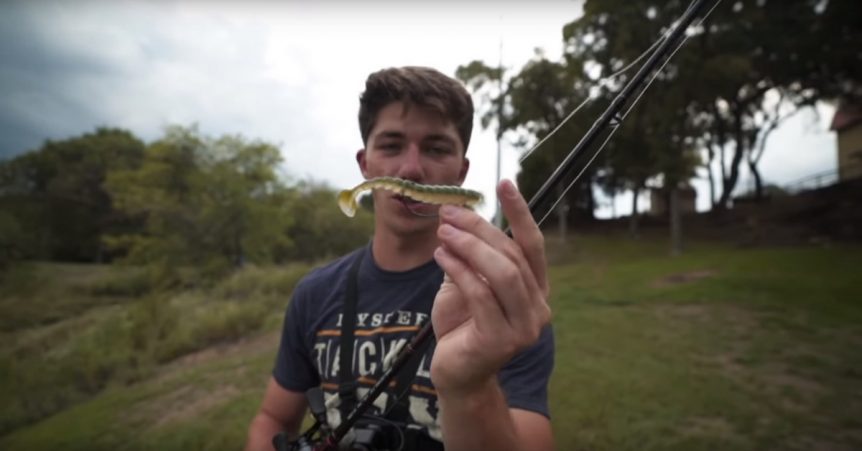A high-dollar bass boat rigged with high-tech electronics is the rage of bass fishing today, but there is a less expensive way to catch bass: Bank fishing.
Bank Fishing Advantages
If you can find the right location, you can catch bass fishing from the bank better than you can from a boat. Some of the advantages of fishing from the bank instead of a boat include the ability to be stealthier and gain access to some hard-to-reach areas such as the upper end of a creek arm where it is too shallow for a bass boat to enter. When you fish from the shore, you can sneak up on shallow bass without having to worry about the noise created by your trolling motor, the ping from your electronics or your outboard motor bumping into the bottom.
Bank Fishing Seasons

Fall and spring are usually the best seasons for fishing from the bank because bass migrate to the shallows either to feed or spawn. I frequently walk the bank of my home waters of Lake of the Ozarks in the spring to sight fish for bass in my cove. When I spot a bass on the nest I can easily work that fish without the distraction of trying to constantly position a boat to keep a safe distance from the nesting bass. In the fall, you can walk a bank and look for schools of baitfish in the back of a creek or cove to find bass.
Some great places to fish for bass from the bank include public access areas; old gravel roads that were flooded when a reservoir was filled; and rock riprap along bridges, marinas or dam spillways. Conservation departments usually sink brush piles in public access areas that are within casting distance from the shore. These brush piles are magnets for bass throughout the year, especially if some are planted in the shallows and others are located in deeper water. The access areas also feature boat ramps that attract baitfish to the algae growing on the ramp’s concrete. The ramps frequently have blow holes at the end of the concrete slab (created by boats powering up on trailers), which bass use as ambush points to nab baitfish feeding on the algae.
Checking a county map will help you find old gravel roads that enter a reservoir. These are bank fishing hotspots because bass use the flooded road as a migration route to the shallows. The flooded road usually features some inundated trees and a ditch along the side of the road that attract bass in the shallows.
Bank Fishing Fish Hideouts

Rock riprap is a great bass attractor because the rocks warm the water and draw bass to the shallows in the winter and spring. Baitfish are also attracted to the rocks to munch on algae and plankton in the summer and fall and the bass use the rocks as cover to ambush the baitfish. Rock riprap along bridges and dam spillways are prime spots to catch bass from the bank because the rocks run from the bank out to deeper water, which allows bass to move up shallow to feed and then quickly escape to deeper water when a cold front arrives or the water level drops suddenly.
Limiting your gear is a necessity when bank fishing for bass because you might have to walk some distance to reach a prime spot. Depending on the season, I usually carry two or three rods: a baitcast outfit with 14- to 20-pound fluorocarbon line for pitching and flipping, a baitcast combo with 14-pound monofilament for topwater lures and maybe a spinning outfit with 8-pound fluorocarbon for finesse lures.
A soft tackle bag capable of storing three large Plano utility boxes is ideal for bank fishing. The lures and terminal tackle you should stock in the bag depends on the season. For winter fishing, I would recommend carrying mostly suspending stickbaits in shad patterns and football jigs in brown or black hues. You should also stock a few bags of soft plastic jig trailers such as plastic chunks or double-tail grubs in green pumpkin, watermelon or pumpkinseed colors.
Bank Fishing Lures

Load your bank fishing bag with a variety of lures in the spring when bass move to the shallows. Medium-diving crankbaits, spinnerbaits, jigs, and topwater walkers or poppers are best for prespawn bass. When bass start nesting, you need to stock your bag with plenty of soft plastics including plastic lizards, creature and beaver baits, tubes, stickworms and soft jerkbaits.
The best lures for summertime bank fishing are deep-diving crankbaits and a variety of plastic worms ranging from 6 to 10 inches. You will also need to stock your bag with worm weights and worm hooks in various sizes. When bass move to the shallows in the fall, stock your bag with plenty of spinnerbaits, buzz baits, squarebill crankbaits, and topwater plugs.

